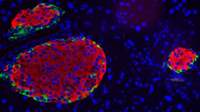INNOVATIVE THERAPEUTICS FOR DIABETES: UNDERSTANDING AND CORRECTION OF INSULIN SECRETION DYSFUNCTION AND LOSS
Department : Physiology and Cancer
Research subject
Pancreatic β cells are the only cell type capable of synthesizing and secreting insulin. While autoimmune mechanisms lead to the loss of b cells in type 1 diabetes, the mechanisms involved in type 2 diabetes are multiple and complex resulting in a lack of insulin secretion and a reduction in β cell mass. Our research projects propose to develop innovative automated insulin delivery systems in order to optimize the supply of insulin, to improve the transplantation of pancreatic islets and to define new targets and therapeutic strategies to prevent the b cell dysfunction and death.
1- Development of automated insulin therapy combining an insulin pump, continuous glucose measurement and control algorithms according to a predictive model ("artificial pancreas") for the therapy of type 1 diabetes.
2- Evaluation of the safety and efficacy of pancreatic islet transplantation in the therapy of insulinopenic diabetes.
3- Development and evaluation of metabolic surgery in diabetes therapy (surgical team of Prof. David Nocca).
4- Better understanding of the molecular and cellular mechanisms controlling the function and survival of pancreatic β cells.
5- Study of the deleterious effects of diabetogenic conditions (high calorie diets rich in fat, chronic hyperglycemia, inflammation) on the secretion and survival of pancreatic β cells.
6- Evaluation of the effectiveness of future drug combinations to preserve insulin secretion. Identification of new therapeutic strategies in order to restore and/or preserve a functional mass of pancreatic β cells in patients with diabetes.
Major publications
- Renard E, Tubiana-Rufi N, Bonnemaison-Gilbert E, Coutant R, Dalla-Vale F, Farret A, Poidvin A, Bouhours-Nouet N, Abettan C, Storey-London C, Donzeau A, Place J, Breton MD. (2019). Closed-loop driven by control-to-range algorithm outperforms threshold-low-glucose-suspend insulin delivery on glucose control albeit not on nocturnal hypoglycaemia in prepubertal patients with type 1 diabetes in a supervised hotel setting. Diabetes Obes Metab 2019 ; 21, 183-187.
- Ruiz L, Gurlo T, Ravier MA, Wojtusciszyn A, Mathieu J, Brown MR, Broca C, Bertrand G, Butler PC, Matveyenko AV, Dalle S, Costes S. (2018) Proteasomal degradation of the histone acetyl transferase p300 contributes to beta-cell injury in a diabetes environment. Cell Death Disease 9(6):600
- Leduc M., Richard J., Costes S., Muller D., Varrault A., Compan V., Mathieu J., Tanti JF., Pagès G., Pouyssegur J., Bertrand G., Dalle S., Ravier MA. (2017) ERK1 is dispensable for mouse pancreatic beta cell function but is necessary for glucose-induced full activation of MSK1 and CREB. Diabetologia 60:1999-2010
- Renard E, Farret A, Kropff J, Bruttomesso D, Messori M, Place J, Visentin R, Calore R, Toffanin C, Di Palma F, Lanzola G, Magni P, Boscari F, Galasso S, Avogaro A, Keith-Hynes P, Kovatchev B, Del Favero S, Cobelli C, Magni L, DeVries JH; AP@home Consortium. (2016). Day-and-Night Closed-Loop Glucose Control in Patients With Type 1 Diabetes Under - Free-Living Conditions: Results of a Single-Arm 1-Month Experience Compared With a Previously Reported Feasibility Study of Evening and Night at Home. Diabetes Care 2016 ; 39, 1151-1160.
- Varin EM., Wojtusciszyn A., Broca C., Muller D., Ravier MA., Ceppo F., Renard E., Tanti JF., Dalle S. (2016) Inhibition of the MAP3 kinase Tpl2 protects rodent and human β-cells from apoptosis and dysfunction induced by cytokines and enhances anti-inflammatory actions of exendin-4. Cell Death Disease 7:e2065






